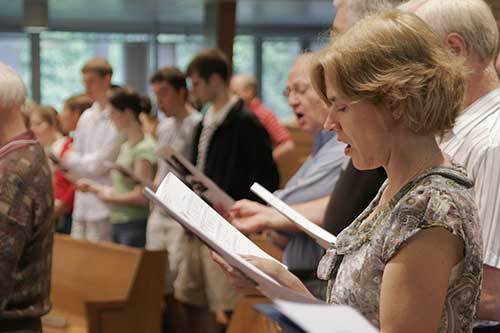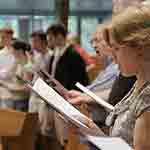
Many Anglicans say they believe things, but they don’t. They believe the opposite of what they say. Anglicans in positions of responsibility (eg. bishops, others ordained,…) even sign that they believe stuff that they don’t.
I will illustrate.
Let’s just start on any random day in, say, 1970. The doctrine of NZ Anglicanism (at that stage called “The Church of the Province of New Zealand”) was that only males could be ordained to the priesthood and episcopate. That was the teaching of the Church. That’s what people said they accepted by their ordination vows and by the documents they signed.
But, many didn’t believe what they said, and what they signed.
The vote to ordain women as priests, introduced in 1972, was lost at General Synod by only one vote in the House of Clergy. In other words – a very significant number of bishops, clergy, and laity – members of General Synod – did NOT accept the doctrine that they said (and signed) that they accepted.
The story, as it continues, is well known. 1974 General Synod passed ordaining women as priests. Diocesan synods were asked to assent (that is the required process). All dioceses, except one, assented.
Let’s just underscore the point I am making: during this post-1974 period, the majority of members of General Synod and of diocesan synods did NOT accept the doctrine that they said (and signed) that they accepted. The doctrine at that time continued to be that only males could be ordained to the priesthood and episcopate.
The story continues.
1976 General Synod confirmed that women could be ordained priests. But, most readers here will know the process for making such change in our Church, it requires another year be allowed for the possibility of an appeal to be made. Such an appeal was made on the second to last day – that ordaining women to the priesthood would depart from the Doctrine and Sacraments of Christ. The Tribunal dismissed the appeal – but by no means unanimously. Two bishops, two priests, and one lay person on the Tribunal dissented from the decision.
The Church’s official doctrine changed. The day before the change, all were vowing and signing that they believed the Church’s doctrine – including that only males could be ordained to the priesthood. The day after the change, those who had previously said and signed that they believed that only males could be ordained to the priesthood were, by these same vows and signatures, now declaring that this belief, previously held, was false.
There are a number of other examples that could be used to illustrate my point – divorce and remarriage; confirmation required before receiving communion;…
In discussions about blessing committed same-sex couples, some clergy have said they cannot bless or marry them solely because of what these clergy have vowed and signed. But, we vow and sign not just to practices but to beliefs, to doctrine, to teaching. We are no more permitted to believe that blessing a committed same-sex couple is possible than we are to actually perform such a blessing.
Now, the reality is, of course, that whilst our Church’s doctrine of marriage holds it to be between a man and a woman, life-long, and monogamous, many clergy, all the way to bishops, believe, teach, and practice that it may not be life-long, and that someone married to one person may divorce that person and marry another. Similarly, many clergy, all the way to bishops, do not accept that marriage is to be between a man and a woman.
This is the fourth in a series of posts responding to the interim report from the Motion 29 Working Group which suggests a structure within our Church which would “safeguard both theological convictions concerning the blessing of same gender relationships”. The first post is here, the second is here, the third is here.
If you appreciated this post, do remember to like the liturgy facebook page, use the RSS feed, and sign up for a not-very-often email, …




What’s the actual vow made at ordination Bosco ?
Many Blessings
There are vows made verbally and documents to be signed, Chris, both at ordination, and at every subsequent appointment.
The ordinal for ordination to the priesthood is here.
There is a declaration required in Part C clause 15 of the Constitution.
There is a Declaration to be made prior to the issue of any licence or permission to officiate or other authorisation to minister in this Church here.
There are parallels for bishops, deacons, and others.
Blessings.
Thank you Bosco.
So the actual commitments made would appear to be:
* to the doctrines of the faith as this Church has received them
* adherence and submission to the authority of the General Synod
* allegiance to the doctrine to which clause 1 of the Fundamental Provisions and clauses 1 and 2 of Part B of that Constitution bear witness.
That would not appear to include the ordination of women, blessing of same sex couples, divorce and remarriage (necessarily), or order of confirmation/holy communion. It would appear to include that Christian marriage is 1 man + 1 woman.
Many Blessings
Thanks, Chris. As my post illustrates, people disagree about what is included (and hence there will be some who disagree with you). The Working Group was tasked to sidestep this disagreement by suggesting a structure in which different viewpoints would live together. Blessings.
Thank you, Bosco, for persisting with this discussion. Your logic on this debate – as on others- is impeccable. I believe there is good evidence that same-sex couples were recognised and blessed in the early Church.
Thanks for the encouragement, Ralph.
I think Chris Sullivan and others have pointed to that evidence.
Blessings.
Hi Bosco,
Not that I disagree with your essential point, for it is most certainly the case that many Anglicans say they believe things that they do not believe. However, would you agree that assenting to a doctrine is not the same as stating belief? Accepting a current teaching does not necessarily including believing it.
I could send my child to a school where pupils are expected to wear a uniform that I believe is sexist. Then, as a parent, I could join the Board and seek to change it.
Is that not the same as accepting ordination and then trying to change some of the doctrines? Is that not how doctrine is changed?
The alternative is that the two houses of Synod containing ordained members would never be able to vote to change anything that was doctrinal at the time of their ordination.
What I would like to hear, within this discussion on belief, is how our priests and bishops explain their belief in the tenets of the creed(s) which they proclaim daily and which is not changeable, even by the three round process of Synod!
Thanks again, as always, for stimulating the discussion.
Peter
Thanks, Peter. I’m not sure that your parallel of the school uniform quite works. We vow to “set forth/maintain the doctrines of the faith as this Church has received them”. And we sign, “I affirm my allegiance to the doctrine”. That seems to me to have a different nuance to sending a child to a school that one thinks should change the uniform.
After publishing this post, I discovered a person independently questioned the use of Church funds for the Ma Whea Commission and the Working Party – whether advocating and inculcating for the blessing of committed same-sex couples (or for Marriage Equality) form a breech of Part C14 of our Constitution (binding under Parliament’s Empowering Act), and if this is a breech in civil law, and, if so, are the members of General Synod Te Hinota Whanui financially liable?!
That clause holds:
So – this person is following a quite similar understanding but going in the opposite direction with it than what I am. [To be fair: some people skim what I write and think I am going in the same direction as this person 🙂 !]
I suggest that actually the situation for our Church is far less clear than our grand language would suggest (surprise!). I also suggest that our Church by having a clear process to change doctrine thereby has an understanding that there will be doctrines that many (in order to change a doctrine – a significant majority) do not accept. So, I repeat my first paragraph: Many Anglicans say they believe things, but they don’t. They believe the opposite of what they say. Anglicans in positions of responsibility (eg. bishops, others ordained,…) even sign that they believe stuff that they don’t.
Thanks, Peter, for facilitating a deepening of this discussion.
Blessings.
By way of comparison Bosco, here is the profession of faith in the Catholic Church. A close reading shows that it is quite nuanced and, with the probable exception of marriage being reserved to 1 man + 1 woman, would not include the other doctrinal matters you mention. The deposit of faith / divine revelation does not include all the matters you list. I think our beloved Anglican friends can rest assured that they do not really have much to worry about here. Together we may continue to develop doctrinal understanding.
http://www.vatican.va/roman_curia/congregations/cfaith/documents/rc_con_cfaith_doc_19880701_professio-fidei_en.html
Many blessings
Thanks, Chris. That’s quite a useful parallel. I note
which appears to be quite parallel to the NZ Anglican “the Doctrine and Sacraments of Christ”. The difference is that RC has a centralised authority to which it can turn, Anglicanism’s authority is dispersed – the example in my post of the history of women’s ordination illustrates this.
Blessings
I was listening to this interview with Dan Brown http://www.bbc.com/news/av/entertainment-arts-41681927/it-s-very-hard-to-step-into-atheism-says-dan-brown
‘One of the challenges of religion is reading metaphor as fact’, we’ve discussed this many times before but even in doctrine and religious practice there are huge gaps between what we say we believe and what we actually believe.
Or the level we believe it on.
If I take the wafer and break it and say ‘this is the body of Christ’ it’s symbolism, but for someone else it’s fact, the transubstantiation has ‘occurred’. And explained away by ‘only the appearance is unchanged’.
I love language and semantics and nuance too, and I think as our societies grow ever less homogeneous one person’s ‘meaning’ may differ significantly from another person’s even where the words or rules or instruction appears the same.
To one person a lot of this would appear as ‘mind games’ to another the questioning or reinterpretation as blasphemy?
I understand your point, and your are right (in defending the LGBT, and I appreciate so much everything you are doing for us).
Nevertheless, as an Easterner by my background, I never understand why people must use “official” things, and label “doctrine” what is not.
When Laurence Tim Oi Lee was ordained to the priesthood, her bishop was reasoning exactly like an Easterner.
When an Easterner (at least up to the fall of the Berliner wall) wondered about the official position of the Church catholic on one topic, the Tradition was asked the question, and the liturgy first and foremost.